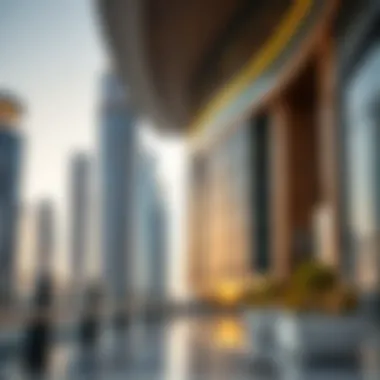Insights into the Dubai Real Estate Market Dynamics


Intro
The Dubai real estate market stands as a unique blend of ambition and innovation. With its high-rising skyscrapers, luxurious villas, and bustling commercial hubs, this market draws investors, buyers, and curious bystanders from every corner of the globe. Understanding this landscape means peeling back the layers of its pricing dynamics, regulatory framework, and emerging trends. This journey offers not only insights but also invaluable opportunities for those looking to invest or simply learn more about this vibrant sector.
Property Market Analysis
Current Market Trends
Lately, the Dubai real estate scene has been bustling with activity. Investors are now more inclined toward properties that offer not just living spaces but a lifestyle. The focus has shifted dramatically towards sustainability and smart living environments, paving the way for projects that emphasize eco-friendly design and energy efficiency. Areas like Dubai Marina and Downtown Dubai have seen significant interest due to their accessibility and luxurious amenities.
- Investors' Interest: There’s a noticeable uptick in foreign investment, especially from countries in Europe and Asia, lured by the favorable regulatory environment and potential for high returns.
- Sustainable Developments: Residential projects boasting eco-friendly features are increasingly popular. Buyers are keen on properties that promise lower utility costs over time and a reduced carbon footprint.
This trend highlights a broader awareness among buyers about their purchasing power when selecting real estate, showcasing a substantial shift in priorities.
Price Fluctuations and Insights
Prices in Dubai’s real estate market are not immune to fluctuations. Recent data indicates that while there may be periods of stability, specific sectors can experience significant changes depending on global market trends and local demand. For instance:
- Luxury Properties: High-end homes often command astronomical prices, yet even these can be affected by macroeconomic factors such as inflation and geopolitical tensions.
- Affordable Housing: On the other end, properties marketed as affordable have gained traction among first-time buyers and investors looking to enter the market without excessive financial burdens.
"In the realm of real estate, timing your investment can mean the difference between a sound deal and a costly mistake."
Investment Opportunities
Key Areas for Property Investment
When eyeing potential investments in Dubai, certain areas stand out more than others. Investors are increasingly focusing on:
- Jumeirah Village Circle (JVC): This location is attractive due to its affordability combined with a variety of amenities including parks and schools.
- Dubai Hills Estate: Known for its lavish luxury homes and golf courses, this area attracts high-net-worth individuals and families looking for quality living.
- Business Bay: Rising as a commercial hub, this area offers lucrative options for those looking to invest in office spaces.
Tips for First-Time Investors
- Research Thoroughly: Knowledge is key. Utilize online platforms and forums like Reddit, or Facebook groups focusing on Dubai real estate.
- Engage a Local Agent: They can provide invaluable insights into market trends, pricing, and investment opportunities.
- Understand the Legal Framework: Familiarize yourself with the regulations specific to property ownership in Dubai. Websites like Dubai Land Department can be a helpful resource.
Approaching the Dubai real estate market with a well-informed mindset can greatly enhance one's chances of making successful investments.
Prolusion to Dubai's Real Estate Market
Dubai's real estate market has paved its own path, making itself a magnet for investors, developers, and buyers from around the globe. This section will lay the groundwork for understanding the nuances of this vibrant market. By exploring the dynamics of Dubai's real estate offerings, we can see how it stands out as a unique entity influenced by local and international variables.
Overview of the Market Landscape
The market landscape of Dubai's real estate is characterized by a mix of high-end luxury properties and more affordable housing options. Investors are often drawn to high-rise apartments and sumptuous villas along the coastline, which symbolize the opulence of the emirate. Yet, affordable housing has been gaining traction too. Areas like Dubai South and International City offer attractive propositions for those looking to invest at a lower entry point.
The contrast in property types creates a compelling market environment where different economic classes can interact, bringing variety and dynamic growth. According to Dubai Land Department statistics, over 36,000 real estate transactions took place in the past year alone, indicating a restless market with varying buyer preferences.
The rental market is equally compelling. High-demand districts such as Downtown Dubai and Dubai Marina command premium rental rates, showcasing just how valuable prime locations are. Conversely, emerging neighborhoods, while not as famous, offer lucrative returns for savvy investors willing to take calculated risks.
"Dubai has transcended its desert origins to become a global city, a real estate jewel reflecting both wealth and diversity."
Historical Context and Development
To fully appreciate the current dynamics of Dubai's real estate, we must first look backward at its historical context. The transformation from a small fishing village to a bustling metropolis began in the 1970s, spearheaded by oil revenue. However, it wasn't just the oil money that shaped today's landscape.
In the late 1990s, the government of Dubai began liberalizing property ownership laws, opening doors for foreign investment. The introduction of freehold property in 2002 was a watershed moment, allowing non-UAE nationals to buy property outright. This act acted like a siren call, luring international buyers like bees to honey, and it profoundly changed the real estate direction, catalyzing rapid developments.
Over the years, Dubai has introduced iconic projects, like the Palm Jumeirah and Burj Khalifa, which serve not just as landmarks but as showcases of architectural audacity. Each development tells a story of ambition and innovation, with a pulse that beats in the heart of the city’s evolution.
In the present day, understanding this historical evolution is crucial for anyone looking to navigate the market effectively. It informs potential investors on where the opportunities lie and highlights the segments that may have become saturated or are ripe for growth.
Key Characteristics of Dubai's Real Estate
Understanding the key characteristics of Dubai's real estate market is essential for anyone looking to navigate its complexities. This market is not just about square footage or flashy buildings. It represents a unique blend of cultures, opportunities, and regulations that can significantly affect investments. Whether you’re an investor, a buyer, an agent, or a developer, grasping these characteristics will provide a roadmap to making informed decisions. Here are some critical elements that shape this dynamic market:


Luxury vs. Affordable Housing
In Dubai, the real estate landscape is often depicted as a tale of two cities: luxury and affordable housing.
- Luxury Housing: The luxury segment includes high-end towers like the Burj Khalifa, lavish villas in the Palm Jumeirah, and exclusive developments in areas like Dubai Marina. These properties typically fetch premium prices, attracting affluent buyers from around the globe. Investors see luxury developments as not just homes but status symbols. The amenities offered, such as private beaches, upscale dining, and concierge services, make these residences highly desirable.
- Affordable Housing: On the flip side, affordable housing options are gaining traction, particularly in newly developed communities such as Dubai South and Jumeirah Village Circle. These projects aim to cater to a broader population, including expatriates and working professionals. They offer essential amenities at price points that are more accessible, making them attractive for long-term renters and buyers.
Both segments cater to distinct demographics, with investors needing to consider their target market preferences. Understanding these dynamics helps stakeholders align their strategies, whether they are looking to invest in luxury developments or promote affordable housing opportunities.
Freehold and Leasehold Properties
Navigating the realm of property ownership in Dubai involves grasping the concepts of freehold and leasehold properties.
- Freehold Properties: These properties allow foreign investors to own land and structures outright, giving them full rights for investment. Freehold ownership is available in designated areas like Dubai Marina, Downtown Dubai, and other prime locations. This type of ownership is appealing to investors seeking long-term capital appreciation and personal use.
- Leasehold Properties: In contrast, leasehold properties can be owned for a specific term, often up to 99 years, after which ownership reverts back to the landowner. This arrangement is common in areas where land is scarce. While leasehold may seem less appealing at first glance, certain projects offer substantial returns, particularly those that are effectively managed and well-located.
Understanding the legal implications of both types of ownership is crucial. Investors and developers must be aware of the laws governing these properties to avoid potential pitfalls.
Architectural Innovations
Dubai's skyline is a testament to architectural innovation. The city has become synonymous with cutting-edge design and engineering feats that push the boundaries of what’s possible. Here are some highlights:
- Iconic Structures: Developments like the Burj Khalifa and the sail-shaped Burj Al Arab showcase Dubai's penchant for architecturally distinct buildings. These structures not only serve functional purposes but also act as iconic symbols of Dubai's modernity.
- Sustainable Designs: Increasingly, there’s a focus on sustainability in real estate development within the region. Projects like The Sustainable City aim to combine luxury living with environmentally-friendly practices. Features such as solar energy usage, water recycling, and green spaces illustrate a commitment to sustainability.
- Smart Developments: The rise of smart homes and buildings equipped with technology that enhances energy efficiency and user experience is also noteworthy. Integration of IoT (Internet of Things) elements allows homeowners to control aspects of their residence remotely, paving the way for a more connected lifestyle.
As the city continues to evolve, architectural innovations will play a pivotal role. They not only attract investors but also create a unique living experience that defines the Dubai lifestyle.
"In Dubai, architecture is not just about function and beauty; it's a statement of ambition and innovation."
The key characteristics of Dubai's real estate market provide a rich tapestry that is vital for anyone attempting to penetrate this lucrative market. From the contrasting dynamics of luxury versus affordable options, to the intricacies of property ownership, and the ongoing innovations redefining skyline, being informed is today’s investor's best weapon.
Market Trends and Analysis
The real estate market in Dubai is not just a maze of skyscrapers and luxury villas; it reflects the region's unique socio-economic dynamics. Understanding market trends is essential for investors, buyers, and industry professionals, as it offers insight into what considerations can impact property value and overall market stability. The constantly changing landscape requires stakeholders to keep their ears to the ground and be on high alert for new opportunities and potential challenges.
By analyzing market trends, individuals can:
- Identify hot areas for investment before they become mainstream.
- Understand the impact of legislation on property values.
- Recognize seasonal fluctuations in demand, which can significantly affect pricing.
Current Market Dynamics
Dubai's real estate market is currently undergoing a transformation, shaped by several factors. The post-pandemic world has seen a surge in demand for residential properties as remote work becomes the new norm for many. Families are seeking larger homes in quieter neighborhoods, a trend apparent in areas such as Dubai Hills Estate and Dubai Marina.
Moreover, the recent influx of expatriates, driven by changes in visa regulations and a growing number of job opportunities, has further stimulated the market. As a result, the competitive landscape has led to rising prices, especially in areas known for their connectivity and amenities. Buyers should remain cautious, mimicking the age-old, “look before you leap” approach, especially when navigating turbulent waters.
Impact of COVID-19 on the Market
The pandemic shifted the sands, so to speak, within Dubai's real estate market. Initially, there was an evident downturn, with many potential buyers taking a back seat. However, as restrictions eased, the market rebounded with surprising strength. The demand for larger spaces and suburban living grew as people reflected on their living conditions during the lockdowns.
Investment in luxurious properties saw a resurgence, signaling confidence returning among buyers and developers. Moreover, the government's swift response to support the economy helped mitigate potential long-term effects, providing a sense of security to stakeholders.
"The unexpected resilience of Dubai’s real estate market post-COVID shows that the market can adapt to changing economic conditions."
Contribution of International Buyers
International investors bring a unique flavor to Dubai's real estate melting pot. Their contributions are significant, not merely in financial terms but also in shaping the diverse property landscape. Areas like Palm Jumeirah and Downtown Dubai have benefitted from a steady influx of foreign capital, enhancing the market’s global reputation.
Factors enticing these buyers include tax advantages, the safety of investment, and the allure of Dubai's lifestyle. Property ownership offers not just security but also a lucrative opportunity in a rapidly accelerating market. It is worth noting that the rise of platforms such as Airbnb has made short-term rentals an appealing prospect for many international buyers, providing a dual income stream.
Investment Opportunities in Dubai
Investing in Dubai's real estate sector offers a unique blend of potential returns, driven by its strategic location and robust infrastructure. With property prices experiencing a rollercoaster ride in the past few years, the present environment is ripe for potential buyers and investors. Understanding the nuances of this market is essential, as opportunities often emerge in unexpected neighborhoods and developments.
These investment opportunities aren’t just about acquiring property; they encompass long-term growth strategies, participation in government-backed initiatives, and careful evaluation of market conditions. For anyone looking to dip their toes into Dubai's property scene, recognizing these facets can significantly influence their success.
Emerging Neighborhoods
In a rapidly changing city like Dubai, emerging neighborhoods often prove to be treasure troves for savvy investors. Areas such as Dubai South, which is located near the Al Maktoum International Airport, are gaining popularity due to numerous upcoming developments and infrastructural upgrades. These neighborhoods offer attractive pricing compared to more established areas like Downtown Dubai or Dubai Marina.


Another locality that is worth considering is Mohammed Bin Rashid City, where plans for integrated communities are taking shape. As schools, parks, and shopping districts continue to sprout, property values are set to escalate. Investing in these neighborhoods allows buyers to capitalize on potential value increases before the rest of the market catches on.
The potential here is tantalizing. Investors should keep an eye on townhouses and off-plan projects as they often come with attractive payment plans, making them more achievable for the average investor.
Government Initiatives and Incentives
Dubai's government has rolled out a plethora of initiatives designed to boost the attractiveness of its real estate market to both local and foreign investors. The introduction of long-term residency visas for property owners, aimed at promoting stability, shows how serious the authorities are about foreign investment. This not only allows for a more secure investment climate but also encourages individuals and families to establish roots in Dubai.
In addition, the Dubai Land Department has taken steps to simplify procedures for property registration and facilitate faster transactions. The various real estate agencies are equipped to provide current and potential investors with the latest updates on government policies. Moreover, the initiative to offer reduced registration fees during certain periods has made a direct impact on purchasing power.
These government incentives ensure that the investment landscape remains appealing, fostering an atmosphere conducive to growth.
Long-term vs. Short-term Investments
When delving into the Dubai real estate market, investors are faced with the timeless question of long-term versus short-term investments. Each approach has its merits and aligns better with different investment strategies and risk appetites.
Long-term investments in Dubai real estate generally involve purchasing properties that are likely to appreciate over time. These could be luxury villas or strategically placed apartments in high-demand areas. Often, they generate rental yields, providing a steady income stream.
On the flip side, short-term investments can be riskier but potentially more lucrative. Flipping properties—buying and then quickly reselling them at higher prices—can yield significant returns in a bustling market. Emerging neighborhoods, as highlighted previously, can often serve as good platforms for short-term investments. The key consideration here is the market timing; fluctuations can impact the return on investment dramatically. Investing in well-researched areas can lead to substantial profits but requires careful attention to market trends.
Invest with your head, not just your heart. Research, observe, and engage with the market before jumping in.
Factors Influencing Property Prices
Understanding the diverse factors that shape property prices in Dubai is essential for buyers, investors, and real estate professionals. The dynamics of price determination cannot be overstated, as they are contingent on a variety of elements. By exploring these factors, you’ll be better positioned to navigate this vibrant market, making informed decisions that align with financial goals and investment strategies.
Economic Indicators
Economic health serves as a foundational pillar in the real estate narrative. Various indicators, such as GDP growth rates, employment statistics, and inflation levels, collectively paint a clearer picture of market vitality.
- GDP Growth Rate: A growing GDP often correlates with increased demand for housing, as both domestic and foreign investments surge.
- Employment Trends: More jobs typically result in higher demand for housing, putting upward pressure on prices.
- Inflation: Rising consumer prices can erode purchasing power, influencing prospective buyers' capability to invest in real estate.
These economic indicators are not merely numbers; they serve as the pulse of the market, reflecting broader trends that ultimately determine how buyers and sellers interact in this bustling ecosystem.
Regulatory Environment
The regulatory framework governing real estate provides essential structure to the market. In Dubai, authorities like the Dubai Land Department oversee transactions, impacting everything from foreign ownership laws to taxes.
- Property Ownership Rules: Understanding whether a property is freehold or leasehold is fundamental. Freehold properties allow foreign buyers full ownership, while leasehold properties can limit ownership rights.
- Taxation: Although Dubai is known for its tax incentives, any changes in this regard can significantly shift the appeal of investing.
- Building Regulations: Compliance with local laws is crucial for developers and buyers alike. Changes in safety codes or construction permits can alter market conditions overnight.
Navigating the intricate regulatory landscape is significant for investors looking to minimize risk and seize opportunities that arise from new regulations.
Cultural Factors
Culture often plays an underappreciated role in shaping the real estate market. The unique blend of traditions and values in Dubai can greatly influence buyer preferences and motivations.
- Expat Influence: A considerable expatriate population drives demand for diverse housing options, as different cultures have varied housing preferences and lifestyles.
- Social Dynamics: Understanding family structures and social expectations can inform investors on the types of properties that might appeal most to buyers.
- Lifestyle Trends: The cultural leanings towards luxury and opulence in Dubai influence the price points of high-end developments, while ongoing shifts toward sustainability affect market expectations.
These cultural nuances often dictate how properties are marketed and sold, making it crucial for investors to grasp the local ethos.
"An in-depth knowledge of these influencing factors will arm potential investors with a strategic edge, positioning them for potential growth in a competitive market."
In summary, the factors influencing property prices in Dubai stem from a mix of economic indicators, regulations, and cultural dimensions. Recognition of these elements will not only deepen your understanding but also enhance your strategic approaches in this dynamic real estate landscape.
Challenges in the Dubai Real Estate Market
The landscape of Dubai's real estate market is as vibrant as its skyline, however, it comes with its own set of challenges. Understanding these challenges is crucial for investors, buyers, and industry professionals who wish to navigate this dynamic environment effectively. The following subsections will drill down into specific issues like market saturation, legal complexities, and economic fluctuations, providing clarity on how these factors affect property investments in Dubai.
Market Saturation and Competition
Dubai's real estate market has been experiencing a notable increase in developments. While this can seem like a boon, it often leads to market saturation. Too many properties on the market can drive prices down and create fierce competition among sellers. New developments often struggle to attract buyers, especially in already crowded areas.
In the last few years, the city has seen a plethora of luxury and mid-range projects each vying for the attention of potential buyers. Markets like Downtown Dubai and Dubai Marina, once prime hotspots, now face an oversupply issue. Developers often need to lower prices or offer incentives such as flexible payment plans just to attract buyers. Investors need to consider this reality when evaluating new projects; it’s essential to conduct thorough market analysis to avoid getting caught in a declining property value scenario.


Legal Complications for Foreign Investors
Investing in Dubai's real estate as a foreign investor can open up many doors, but there are also some legal hurdles to consider. The UAE has specific regulations in place that can sometimes be complex to navigate. Foreign ownership limitations, property registration processes, and the necessity of understanding local laws can make the venture daunting.
Take for example, the rule of 51% local ownership for companies interested in investing, which can add layers of difficulty. Furthermore, foreign buyers could face different financing options compared to local investors, limiting their choices. Understanding the rights and responsibilities defined in the property contracts is necessary to mitigate any future disputes. Furthermore, consulting with legal experts familiar with UAE property laws is often advisable to avoid pitfalls.
Economic Uncertainty
Economic uncertainties also pose a challenge to the stability of the Dubai real estate market. Global events, like fluctuations in oil prices and geopolitical tensions, have ripple effects that can affect investor confidence. When the economy is shaky, buyers tend to shy away from high-value investments.
For example, during times of global economic downturn, property prices may decrease due to falling demand. The ripple effect can also affect rental rates and occupancy levels. Investors need to remain vigilant and keep an eye on global economic indicators that could impact local real estate dynamics. The wise investor keeps a pulse on both local and international economies as they craft their strategies.
"Real estate investment in Dubai can be lucrative but is not without its challenges. Awareness of market saturation, legal complexities, and economic fluctuations can significantly influence investment success."
In summary, while Dubai offers a promising real estate landscape, challenges such as market saturation, legal complications for foreigners, and economic uncertainties can complicate the investment journey. Staying informed and prepared can make all the difference in making sound investment decisions.
Future Outlook of the Dubai Real Estate Market
As we cast our eyes on the horizon of the Dubai real estate market, it becomes evident that its future is a collage of innovation and opportunity. Understanding where this market is headed is vital for investors, buyers, and industry professionals alike. The decisions made in the coming years will shape not just individual portfolios but also the broader economic fabric of the region. Given Dubai's breath-taking ambitions and strategic location, the dynamics at play offer various benefits and considerations that are pivotal when looking to invest.
Predicted Growth Sectors
Dubai is often seen as a playground for the wealthy, but beyond the glitz, there are sectors poised for significant growth. One can't overlook the allure of the hospitality and tourism spheres. With the city hosting events like Expo 2020, there is a renewed vigor in building hotels and leisure facilities. Additionally, the healthcare and education sectors are seeing increased funds flowing in due to the city’s efforts to position itself as a global healthcare hub.
Some key areas expected to grow include:
- Affordable housing: As demand for reasonable accommodation increases, investors are turning towards projects that cater to middle-income residents.
- E-commerce logistics: With online shopping gaining traction, warehousing and logistics hubs are sprouting, providing expansive opportunities.
- Green communities: Eco-friendly developments are gaining traction, aligning with global sustainability trends and attracting environmentally conscious buyers.
Sustainability Trends
Sustainability is not just a buzzword in Dubai; it's becoming a core value within the real estate sector. With an escalating focus on eco-friendly living, several developments now emphasize green spaces, energy-efficient buildings, and sustainable materials. The government is backing these moves, incentivizing developers who integrate sustainability into their projects.
Investors should keep a close watch on:
- Green building certifications: Look for properties that have LEED or Estidama certifications, which can enhance property value.
- Renewable energy: Communities that use solar panels and other renewable sources are becoming increasingly appealing to both renters and buyers.
- Water conservation: Developments implementing smart water management systems can reduce operational costs, which is a win-win.
Technological Advances in Real Estate
The integration of technology in Dubai's real estate sector is nothing short of revolutionary. From augmented reality property tours to blockchain real estate transactions, technology is streamlining processes and enhancing the buyer experience. Investors who ignore these changes may find themselves left behind.
Important technological trends include:
- Smart homes: Properties equipped with IoT devices that provide automation for energy management and security.
- Proptech solutions: Start-ups are innovating ways to simplify property management, sales, and rental services, which can be a game changer in market efficiency.
- Data analytics: Advanced data analytics are helping investors make informed decisions by understanding market trends, buyer preferences, and risk assessment.
Investing in technologies not only future-proofs your portfolio but can also lead to increased returns and operational efficiency.
The future outlook of the Dubai real estate market is filled with promise, yet understanding these trends will be crucial for making informed decisions. Investors, buyers, and real estate professionals must adapt to the evolving landscape, leveraging insights to optimize their strategies for success in this dynamic environment.
Closure
In summary, understanding the dynamics of Dubai's real estate market is pivotal for anyone looking to invest or even just try to get their footing in the ever-evolving landscape. This article condenses essential insights and offers a roadmap to navigate through the complexities that define this vibrant real estate arena. Factors like local regulations, economic indicators, competition, and buyer preferences play a crucial role in shaping the market. Investors need to consider these elements as they make their decisions. With a market as distinctive as Dubai's, a rigid understanding can mean the difference between a profitable venture and a regrettable misstep.
A structured approach is necessary, breaking down the vast expanse of opportunities while maintaining awareness of potential pitfalls.
Recap of Key Insights
Throughout this article, several pivotal points have been discussed:
- Market Characteristics: The blend of luxury and affordable housing options offers diverse opportunities to investors at varying price points.
- Regulatory Framework: Understanding the legal environment regarding ownership and investment is crucial for both local and foreign investors. Aspects like freehold and leasehold properties create varied access levels in the market.
- Emerging Trends: The effects of COVID-19 have reshaped investor interests while sustainability trends and technological advances signal a forward-thinking market.
- Investment Considerations: Assessing long-term versus short-term investments is imperative, especially with government incentives in play that focus on fostering development in emerging neighborhoods.
These insights create a compendium of knowledge that arms investors with what they need to make informed decisions.
Final Thoughts for Investors
For potential investors eyeing Dubai, the stakes are pinnacle but the rewards can be substantial. To put it plainly, laying a solid groundwork in understanding local market trends, the interplay of supply and demand, as well as future growth sectors will be instrumental in achieving success. Like any other real estate market, staying informed and adaptable is paramount.
"In Dubai's real estate market, potential often rides hand in hand with risk. Educate yourself well."
It's wise to harness the benefit of local expertise, be it through real estate agents or industry analysts, who can shed light on the subtle nuances that may not be apparent at first glance. By doing so, investors can not only mitigate risks but also position themselves advantageously within this dynamic market.
Lastly, it’s also critical to keep an eye on global events that could impactDubai's property landscape. The delicate balance that governs the real estate market here is sensitive to both local sentiments and international trends, making continuous learning and adaptability a must. Investing in real estate in Dubai is not just about finding property; it’s about understanding the very factors that lead to transformative ventures.











